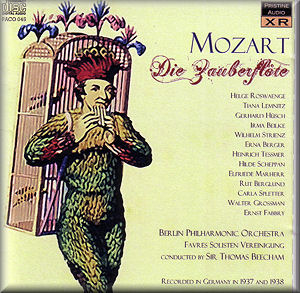 |
 |
|

Availability
CD: Pristine Classical
|
Wolfgang Amadeus
MOZART (1756 - 1791)
Die Zauberflöte (1791)
 Helge Roswaenge (tenor) - Tamino; Tiana Lemnitz (soprano) - Pamina;
Gerhard Hüsch (baritone) - Papageno; Irma Beilke (soprano)
- Papagena; Old Woman; First Boy; Wilhelm Strienz (bass) - Sarastro;
Erna Berger (soprano) - Queen of the Night; Heinrich Tessmer (tenor)
- Monostatos; First Man in Armour; Hilde Scheppan (soprano) - First
Lady; Elfriede Marherr (soprano) - Second Lady; Rut Berglund (contralto)
- Thitd Lady; Third Boy; Carla Spletter (soprano) - Second Boy;
Walter Grossman (bass) - Speaker; Ernst Fabbry (tenor) - Priest;
Helge Roswaenge (tenor) - Tamino; Tiana Lemnitz (soprano) - Pamina;
Gerhard Hüsch (baritone) - Papageno; Irma Beilke (soprano)
- Papagena; Old Woman; First Boy; Wilhelm Strienz (bass) - Sarastro;
Erna Berger (soprano) - Queen of the Night; Heinrich Tessmer (tenor)
- Monostatos; First Man in Armour; Hilde Scheppan (soprano) - First
Lady; Elfriede Marherr (soprano) - Second Lady; Rut Berglund (contralto)
- Thitd Lady; Third Boy; Carla Spletter (soprano) - Second Boy;
Walter Grossman (bass) - Speaker; Ernst Fabbry (tenor) - Priest;
Favres Solisten Vereinigung; Berlin Philharmonic Orchestra/Sir Thomas
Beecham
rec. Beethovensaal, Berlin, 8-10, 12, 13, 15 November 1937; 24 February,
2, 8 March 1938
 PRISTINE AUDIO PACO045 [61:30 + 69:26]
PRISTINE AUDIO PACO045 [61:30 + 69:26] 
|
|
|
We have come to expect impressive sound from Andrew Rose’s
XR re-mastering and he has ensured both clarity and dynamic
power. I haven’t listened to this set for quite some time
- not since the LP era in fact although I have heard some re-mastered
excerpts, but I wasn’t prepared for such ‘modern’
sound. Without knowing the origin I would have guessed it was
a good mono recording from the 1950s. So on these grounds alone
this set can be heartily recommended to all lovers of Die
Zauberflöte. Keep in mind, though, that it was recorded
without the spoken dialogue. This means that the individual
numbers come in quick succession, very much as they wound do
on a highlights disc.
What I had forgotten was the weightiness of Beecham’s
reading. The powerful first chord rings out with almost Wagnerian
solemnity and this is an impression that prevails throughout
the overture. Even the quick second half has more dramatic weight
than Singspiel jollity.
This impression is reinforced when we are confronted with Helge
Roswaenge’s Tamino. Roswaenge was known more for his brilliant
top notes and dramatic heft than lyrical flexibility and elegance.
Here one associates the results more readily with Wagnerian
effortfulness than Mozartean warmth. He is closer in approach
to Siegfried than to Tamino. I must qualify this verdict to
some extent. In Dies Bildnis ist bezaubernd schön
he is more nuanced and actually quite lovable. Maybe he was
inspired by Gerhard Hüsch’s famous reading of Papageno
and his interpretation of Der Vogelfänger bin ich ja,
which was heard just before the Tamino aria. Listening closely
to Hüsch I have to admit that there are baritones from
more modern times who have imbued the aria with greater spirit
and/or elegance. Dietrich Fischer-Dieskau and Walter Berry are
two singers who, in their contrasting ways, have come closer
to the character. Hüsch feels ‘every-day-penny-plain’.
He is much better later on in the opera and in particular in
Ein Mädchen oder Weibchen, where his Lieder singer
experience and care for words is a great asset. And the suicide
scene is deeply moving.
Erna Berger was also a quite successful Lieder singer towards
the end of her career in the 1950s. I still treasure a couple
of Deutsche Grammophon LPs with her. More than fifteen years
before that she was a brilliant Queen of the Night. In her first
aria she also displays a warmth that makes ‘die sternflammende
Königin’ more human. Her runs are occasionally smudged
and a couple of her top notes are slightly out of pitch. This
is however a worthy reading of this exacting aria and Der
Hölle Rache in the second act is sung with awesome
accuracy.
Tiana Lemnitz is a lovely Pamina, some scooping apart. The duet
with PapagenoBei Männern is one of the highlights
of the recording and her aria Ach, ich fühl’s
is lovely and sensitive. Wilhelm Strientz is a lightweight Sarastro
but sings with great warmth and has the required low notes.
Both his arias are good. His legato in In diesen heil’gen
Hallen is admirable - and so is his diction. Walter Grossmann
is a warm and fatherly Speaker and in the musically remarkable
confrontation scene between him and Tamino, Roswaenge is at
his most heroic with biting defiance. Heinrich Tessmer is a
splendid Monostatos.
I find that Pamina and Tamino are a curiously mismatched couple
- especially in the Der, welche wandelt scene: she delightful
as a lily, he knotty as an oak-tree.
In spite of some misgivings this is still a desirable recording.
When it was new, more than seventy years ago, it must have been
a revelation to many. Berger, Lemnitz and Hüsch can stand
comparison with some of the best singers on modern sets and
most of the others are more than acceptable.
For a comparable modern recording without spoken dialogue, Klemperer
is a first recommendation with Gundula Janowith (Pamina), Lucia
Popp (Queen of the Night) in her first recording, Nicolai Gedda
(Tamino), Walter Berry (Papageno) and Gottlob Frick (Sarastro).
Elisabeth Schwarzkopf and Christa Ludwig are luxury casting
as First and Second Ladies. For complete recordings with dialogue
Karl Böhm’s DG set, roughly contemporaneous with
Klemperer, is still my favourite: Fritz Wunderlich (Tamino),
Dietrich Fischer-Dieskau (Papageno), Franz Crass (Sarastro)
and Hans Hotter (Speaker) are top contenders. Evelyn Lear (Pamina)
and Roberta Peters (Queen of the Night) are not quite in their
league. I also have a soft spot for the Wolfgang Sawallisch
version. With remarkably refurbished sound this Beecham set
should find an honoured place as an historic alternative in
many a collection.
Göran Forsling
|
|
|




 All Nimbus reviews
All Nimbus reviews








